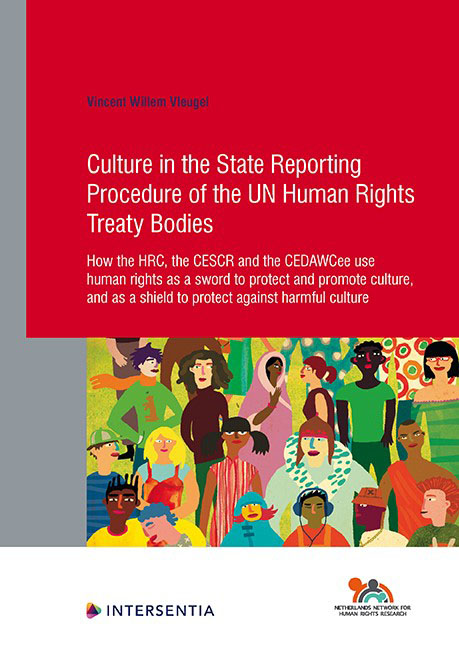 Culture in the State Reporting Procedure of the UN Human Rights Treaty Bodies
Culture in the State Reporting Procedure of the UN Human Rights Treaty Bodies Book contents
- Frontmatter
- Acknowledgements
- Contents
- Abbreviations
- Note on Citation Formats
- Note on Grammar
- Chapter 1 Introduction
- Chapter 2 Human Rights and Cultural Diversity. Between and Beyond Universalism and Cultural Relativism
- Chapter 3 UN Treaty Bodies. Treaties, Committees, Working Methods
- Chapter 4 Human Rights as a Sword. To Protect and Promote Cultural Diversity
- Chapter 5 Human Rights as a Shield. To Protect against Harmful Aspects of Culture
- Chapter 6 Cultural Argumentation. The State Reporting Procedure as a Platform for Cross-Cultural Dialogue
- Chapter 7 Conclusions. How the Treaty Bodies Universalise Human Rights
- Bibliography
- Summary
- Samenvatting
- Human Rights Research Series
- Frontmatter
- Acknowledgements
- Contents
- Abbreviations
- Note on Citation Formats
- Note on Grammar
- Chapter 1 Introduction
- Chapter 2 Human Rights and Cultural Diversity. Between and Beyond Universalism and Cultural Relativism
- Chapter 3 UN Treaty Bodies. Treaties, Committees, Working Methods
- Chapter 4 Human Rights as a Sword. To Protect and Promote Cultural Diversity
- Chapter 5 Human Rights as a Shield. To Protect against Harmful Aspects of Culture
- Chapter 6 Cultural Argumentation. The State Reporting Procedure as a Platform for Cross-Cultural Dialogue
- Chapter 7 Conclusions. How the Treaty Bodies Universalise Human Rights
- Bibliography
- Summary
- Samenvatting
- Human Rights Research Series
Summary
INTRODUCTION
The overarching research objective of this research is to map and analyse the ways in which culture features in the UN treaty bodies’ State reporting procedure.
Ever since the adoption of the Universal Declaration of Human Rights in 1948 there has been a debate on the issue of universality of human rights and cultural diversity. In general, however, the conclusion can be drawn that, nowadays, this debate is not so much framed in terms of opposites, but more in terms of reconciling universal human rights and cultural diversity.
Under the international human rights’ framework, States are allowed to take cultural particularities into account when implementing the treaties. The UN human rights treaty bodies which monitor the implementation of the treaties by States have the task to safeguard the universality of human rights against a background of profound cultural diversity. Little research has been done on how these bodies have dealt with this task in practice, and in particular the use of their main monitoring tool: the State reporting procedure.
Existing literature is to a large extent focused on the negative aspects of culture, while relatively little attention has been paid to the relationship between human rights and positive aspects of culture. In addition, previous research has mainly focused on the way in which culture is given a place in concrete cases of dispute resolution, such as in the case law of the European Court of Human Rights and in individual complaints at the UN treaty bodies. Less is known about the way in which this is done in the State reporting procedure, in which States are asked to explain their progress in complying with the relevant treaty, and discuss this with the relevant UN treaty body. The UN treaty bodies have an important role to play in ensuring a proper balance between safeguarding the universality of the rights in question, while at the same time leaving room for cultural particularities in the interpretation and implementation of those rights by States. The purpose of this study is to clarify how the UN treaty bodies fulfil this role.
The study is confined to the monitoring bodies of three of these UN treaties: the Human Rights Committee (HRC), which oversees the International Covenant on Civil and Political Rights (ICCPR);
- Type
- Chapter
- Information
- Culture in the State Reporting Procedure of the UN Human Rights Treaty BodiesHow the HRC, the CESCR and the CEDAWCee use human rights as a sword to protect and promote culture, and as a shield to protect against harmful culture, pp. 361 - 368Publisher: IntersentiaPrint publication year: 2020


